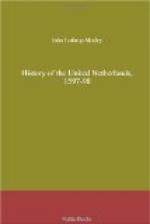It was a dismal, drizzly, foggy morning; the weather changing to steady rain as the expedition advanced. There had been alternate frost and thaw for the few previous weeks, and had that condition of the atmosphere continued the adventure could not have been attempted. It had now turned completely to thaw. The roads were all under water, and the march was sufficiently difficult. Nevertheless, it was possible; so the stout Hollanders, Zeelanders, and Englishmen struggled on manfully, shoulder to shoulder, through the mist and the mire. By nightfall the expedition had reached Ravels, at less than a league’s distance from Turnhout, having accomplished, under the circumstances, a very remarkable march of over twenty miles. A stream of water, the Neethe, one of the tributaries of the Scheld, separated Ravels from Turnhout, and was crossed by a stone bridge. It was an anxious moment. Maurice discovered by his scouts that he was almost within cannon-shot of several of the most famous regiments in the Spanish army lying fresh, securely posted, and capable of making an attack at any moment. He instantly threw forward Marcellus Bax with four squadrons of Bergen cavalry, who, jaded as they were by their day’s work, were to watch the bridge that night, and to hold it against all comers and at every hazard.
The Spanish commander, on his part, had reconnoitred the advancing, foe, for it was impossible for the movement to have been so secret or so swift over those inundated roads as to be shrouded to the last moment in complete mystery. It was naturally to be expected therefore that those splendid legions—the famous Neapolitan tercio of Trevico, the veteran troops of Sultz and Hachicourt, the picked Epirote and Spanish cavalry of Nicolas Basta and Guzman—would be hurled upon the wearied, benumbed, bemired soldiers of the republic, as they came slowly along after their long march through the cold winter’s rain.
Varax took no such heroic resolution. Had he done so that January afternoon, the career of Maurice of Nassau might have been brought to a sudden close, despite the affectionate warning of the state-council. Certainly it was difficult for any commander to be placed in a more perilous position than that in which the stadholder found himself. He remained awake and afoot the whole night, perfecting his arrangements for the morning, and watching every indication of a possible advance on the part of the enemy. Marcellus Bax and his troopers remained at the bridge till morning, and were so near the Spaniards that they heard the voices of their pickets, and could even distinguish in the distance the various movements in their camp.




